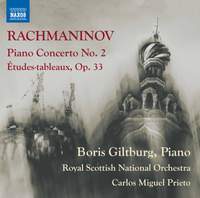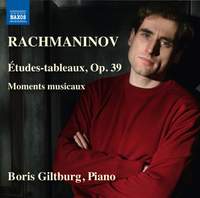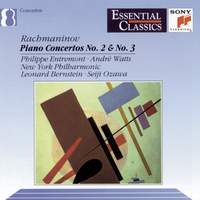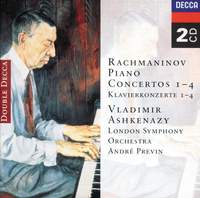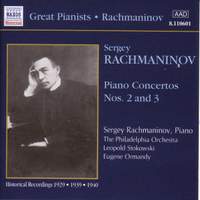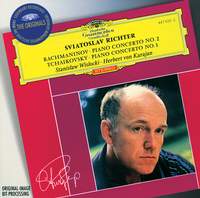Interview,
Boris Giltburg on Rachmaninov
 The young Israeli pianist Boris Giltburg is renown for his affinity with Rachmaninov's music: his recording of the Etudes-Tableaux Op. 39 and Moments musicaux (released on Naxos last year) prompted The Observer to describe him as 'a natural Rachmaninov interpreter', whilst Gramophone hailed him as 'that genuine rarity: a pianist whose Rachmaninov is entirely idiomatic yet intensely personal in a way that yields fresh perspectives on this well traversed repertory'. Now he's embarked on a series of the works for piano and orchestra, starting with Second Piano Concerto (out tomorrow on Naxos, with the Royal Scottish National Orchestra and Carlos Miguel Prieto). I spoke to Boris last week about his passion for a composer who's captivated him since childhood, his influences and inspirations in this repertoire, and the impact of Rachmaninov's own recordings of his music…
The young Israeli pianist Boris Giltburg is renown for his affinity with Rachmaninov's music: his recording of the Etudes-Tableaux Op. 39 and Moments musicaux (released on Naxos last year) prompted The Observer to describe him as 'a natural Rachmaninov interpreter', whilst Gramophone hailed him as 'that genuine rarity: a pianist whose Rachmaninov is entirely idiomatic yet intensely personal in a way that yields fresh perspectives on this well traversed repertory'. Now he's embarked on a series of the works for piano and orchestra, starting with Second Piano Concerto (out tomorrow on Naxos, with the Royal Scottish National Orchestra and Carlos Miguel Prieto). I spoke to Boris last week about his passion for a composer who's captivated him since childhood, his influences and inspirations in this repertoire, and the impact of Rachmaninov's own recordings of his music…
Tell me about your first encounter with the Second Concerto…
It was at my great-aunt’s house (I think I was 9 at the time): she had quite an extensive CD collection, and one of the first recordings that caught my eye was the Second and Third Rachmaninov Piano Concertos. It was both my first encounter with listening to CDs in general and my first ever experience of hearing Rachmaninov, and I remember that I just couldn’t stop listening to the Second. The Third I didn’t enjoy as much back then, though I came to love it later - but even at that very young age I felt an immediate connection to the Second.
Do you remember which particular recording that was?
It was a Sony recording, with André Watts playing the Third Concerto and Philippe Entremont the Second.
When do you first tackle the concerti yourself?
The concerti came quite a lot later, but maybe one or two years later I started playing some of his shorter piano pieces – first the Preludes, and later some of the études - and eventually learned the Third Concerto when I was 16. The second I think came a year later, and around that time I also discovered the First, which was the start of an even stronger love affair. The second movement in particular I thought was breath-taking. So it was a case of his music surrounding me more and more: I also discovered his romances and art-songs around the same time. As a teenager in Israel I worked a lot with a Russian bass who sang mostly Russian repertoire, including several Rachmaninov songs.
The Second Concerto remains by far the most popular of Rachmaninov’s four concerti: why do you think this work exerts such a particular pull over audiences?
I think it’s because it has such a highly concentrated emotional impact, which is also very direct. It doesn’t need you to do anything - it just washes over you like a huge wave, from the very first moments. It conquers you, it pulls you in. This happens to the soloist in the same way: you build up those chords, you play the arpeggios, and then the theme comes in…and in that moment when 36 or 40 violins play that melody, there's almost a physical sensation on stage of this presence of that music. I always feel as if I'm trying not to be overwhelmed, not to drown, and this is the same appeal for the listener, this incredibly strong emotional impact. The melodies (of which there is a very generous amount) just flow one after the other, and they all seem at least to me to bypass the brain and go directly to your heart or some more instinctive place, so that there is no need to analyse the music – you can appreciate it on some completely instinctive emotional level. I want to say, though, that if you do analyse it, it is extremely cleverly written. There is a lot of precision and detail and thought in the structure, so even though it seems as if it’s just one huge emotional wave, it is actually as detailed as any score from the Classical period – you see the same attention to detail that you find in Beethoven or Schubert.
A lot of performers who record very popular works talk of feeling the need to strip away accumulated performance-traditions – has this been your experience with this piece?
I think it can happen naturally if you take the score itself as your source-text. If you don’t listen to other interpretations and just look at the score itself, then you will immediately see that there are things which have become performance-traditions which do not come directly from the score, and then you as a performer have a choice whether you embrace this tradition and become part of it or whether you go with the score only. With Rachmaninov’s concerti, there is the extra layer which is the composer’s own recordings. One can see it two ways – you can say even if Rachmaninov does things in performance which aren’t in the score, his authority as the composer means that in a sense becomes part of the score. But I read in an interview which he himself gave that he said when he listened to other musicians playing his music he would discover things in his own pieces of which he wasn’t consciously aware. It seemed that he believed that his own performances were already an interpretation, and by extension became just one of many possible interpretations. So I think for me personally, the absolute, ultimate truth is with the score as a source of information.
We’ve talked of the importance of resisting other recordings when preparing a work for performance - but are there other specific interpretations that have inspired you over the years?
Yes, several. I mentioned Rachmaninov’s own recordings, of course, and I find Richter’s recording of the Second (on Deutsche Grammophon) extremely strong - but that’s not a recording that you can really learn a lot from as such! It’s just there as a monolith, as something that is hermetically sealed: it requires Richter’s personality and mind and soul to exist, so it’s not something you can take a great deal away from (other than tremendous enjoyment, of course, and also a feeling of awe). I remember that as a kid I really loved Ashkenazy’s set of the concerti, and there’s a wonderful recording of No. 1 by Byron Janis - the first I ever heard, in fact, and that became very special to me. But for No. 2, it’s really Rachmaninov, Richter and Ashkenazy. It was through Ashkenazy that I discovered a lot of Rachmaninov’s music – the two-piano repertoire which he recorded with André Previn, the Preludes and so on.
You had huge success a couple of years ago with your recording of the Études-Tableaux Op. 39 on Naxos – do you feel a special kinship between the set of Études (Op. 33) on the new recording and the concerto itself?
It’s one of contrasts, of opposition: the Études come from a much later stage in Rachmaninov’s compositional career, and they are much more muscular and lean and concise. I felt in a way that because the Second Concerto is so romantic, so lush and emotional (and I love it for all of those things), I also wanted to show another side to Rachmaninov, a side which is more compact, dense, and dry. It’s also interesting that Rachmaninov said that he didn’t like writing short piano pieces – he said that ‘there was neither beauty nor joy in this occupation’. He felt that in his concertos and symphonies many things were written with a single breath or a single brush-stroke, whereas in the short pieces everything required hard and very meticulous work in order to refine the idea to its most distilled form. In a way it’s like a novel versus a short story.
What’s interesting, though, is that despite him not liking this occupation he wrote a very large number of these shorter pieces - and I think that’s our great good fortune, because some of his most memorable music is in this short form.
And the little ‘Polka WR’ towards the end of the recording is now recognised as not actually being by Rachmaninov?
It’s an arrangement of a salon piece by someone call Franz Behr, who I’d not heard of before I found out that he wrote this polka! Rachmaninov based it on what he knew as a favourite tune of his father - he thought it was a melody that his father picked up from somewhere but he didn’t think it was actually a piece by another composer, which is why he never designated it as an arrangement. There is a nice story in a book of reminiscences of Rachmaninov about an artist who painted Rachmaninov's portrait around the time he was making the arrangement: Rachmaninov took him to the piano and played him both versions, the original and his own transcription. The painter said that he preferred the original, and Rachmaninov said ‘Yes, I think so, too because mine is overworked!’. But I don’t think so – I think it shows a wonderful sense of humour, it’s spiky, it’s sparkling, and I think it’s just a wonderful piece of music.
Do you have plans to record the other concerti?
Absolutely – No. 3 is coming next, coupled with the Corelli Variations, with the same orchestra and conductor – that’ll be at some point early next year.
Rachmaninov: Piano Concerto No. 2 & Etudes-tableaux Op. 33
Boris Giltburg (piano), Royal Scottish National Orchestra, Carlos Miguel Prieto
Boris Giltburg's recording of Rachmaninov's Second Piano Concerto is released on Naxos on 8th September.
Available Formats: CD, MP3, FLAC, Hi-Res FLAC
Other recordings referenced in this interview
Boris Giltburg (piano)
Available Formats: CD, MP3, FLAC, Hi-Res FLAC
Philippe Entremont (piano - No. 2), André Watts (piano - No. 3) New York Philharmonic Orchestra, Leonard Bernstein
Available Formats: MP3, FLAC
Vladimir Ashkenazy (piano), London Symphony Orchestra, André Previn
Available Formats: 2 CDs, MP3, FLAC
Sergey Rachmaninov (piano), Philadelphia Orchestra
Available Formats: CD, MP3, FLAC
Sviatoslav Richter (piano), Warsaw Philharmonic Orchestra, Stanislaw Wislocki
Available Formats: CD, MP3, FLAC


